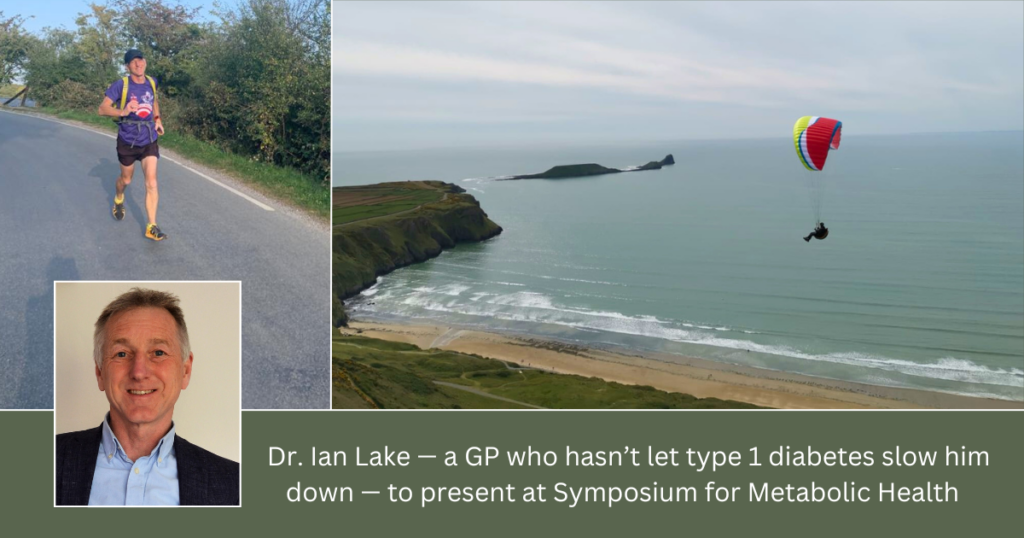Dr. Ian Lake — a UK GP With type 1 diabetes who has run 100 miles fasted & resumed the sport of paragliding — will guide patients & practitioners at upcoming Symposium
In the lead-up to the 8th Annual Symposium for Metabolic Health, scheduled for January 12-14 in Boca Raton, we had the opportunity to engage in conversation with Dr. Ian Lake, one of the many esteemed experts set to present at this conference. While the symposium features a roster of professionals each bringing valuable insights, Dr. Lake’s unique blend of medical expertise and personal experience with type 1 diabetes makes his perspective particularly enlightening. His extensive career with the NHS and personal success with reduced carbohydrate lifestyle underscore the practical application of his knowledge, which has been transformative in managing his own type 1 diabetes.
This Symposium is highly anticipated as a critical event for the Type 1 diabetes community, attracting both patients and medical professionals. It features a specially curated workshop for practitioners scheduled for Thursday, January 11th (RSVP required) with a comprehensive day dedicated to type 1 diabetes discussions on Friday, January 12th.
Additionally, the Symposium will present an extensive program covering a broad spectrum of metabolic therapy topics. This includes sessions on carbohydrate reduction strategies for, and research in, type 2 diabetes, fatty liver, obesity, cardiovascular disease, neurological disorders, as well as mental health conditions, and so much more, offering groundbreaking insights into contemporary treatment modalities.
Navigating Ketosis with Dr. Ian Lake: Practical Transition Strategies
Attendees at the special workshop dedicated to type 1 diabetes on Thursday, January 11, will gain insights from Dr. Lake’s unique perspective as both a seasoned physician and a person managing Type 1 diabetes. Dr. Lake’s extensive experience with both traditional high-carbohydrate management and a ketogenic lifestyle for nearly a decade equips him with the knowledge to adeptly navigate others through the shift to ketosis. The knowledge he imparts promises to be as practical as it is insightful, focusing on the critical relationship between diet, lifestyle factors, and insulin management.
“I’m using the workshop as an opportunity to help people see how to transition safely to ketosis from a conventional diet while adjusting your insulin,” Dr. Lake explained, aiming to simplify what can often be a daunting process. “It’s embarrassingly easy if you’ve been taught the methodology for managing insulin around carbohydrates.”
In the workshop, Dr. Lake is set to clarify the role of insulin in diabetes management, framing it not just as a means of controlling blood sugar but also as a vital aspect of hormone replacement therapy. “The primary cause of type 1 diabetes is lack of a hormone, and we have to put it back in, but we’re putting it into the wrong place,” he said, highlighting the often-overlooked complexities associated with insulin therapy.
Utilizing continuous glucose monitor (CGM) data, Dr. Lake will provide concrete examples of how insulin can be managed across various activities, particularly sports and exercise. “As people with type 1 diabetes, we have to learn how to manage insulin around our diet,” he asserts, acknowledging the diverse management needs based on each individual’s lifestyle and choices, and the invaluable tool in being able to see blood sugar fluctuations in real time.
Tailoring Diabetes Management for Athletic Endeavors
Dr. Lake’s main presentation on Friday will offer an in-depth analysis of managing the type 1 diabetes within the context of sports and physical exertion. His presentation is poised to contrast the standard management algorithms with a ketogenic approach, aiming to demystify their application across the diverse energy requirements of various sports.
“Some people will choose to fuel their sport with carbohydrates. Others, like myself, opt for a ketogenic approach, especially when our activities are subject to unpredictable circumstances,” Dr. Lake explained, highlighting the need for adaptable diabetes management strategies in the face of the dynamic nature of sports and exercise.
Dr. Lake’s presentation is tailored to empower and educate both individuals living with Type 1 diabetes and the clinicians who support them. His goal is to share an overall strategy, grounded in his own experiences, to foster informed decision-making within diabetes management, particularly for those involved in sports. “I think that will help people with type 1, and certainly help clinicians to understand the needs of type 1s in sport,” he said, suggesting that his insights will lay the groundwork for personalized guidance and greater self-sufficiency for those adjusting their diabetes care in alignment with active lifestyles.
Expanding on this theme, Dr. Lake will recount the rigorous planning essential for engaging in sports like paragliding, where variables such as weather and physical exertion dramatically influence diabetes management. “You have to start to manage your insulin the day before… and then you encounter the unplanned and have to start again,” he said, setting the stage for a discussion on the adaptability required in such scenarios.
He will examine not only the preparation that precedes such activities but also the real-time challenges presented by them. The ascent to the launch site, laden with gear, serves as more than just a physical challenge; it is a crucial factor in determining insulin management. Dr. Lake will share, “And then when you get to the top of the hill, you may fly within 10-15 minutes, which is typical, or you may be delayed while you’re waiting for the wind to either pick up, change direction, or drop,” highlighting the need for constant vigilance and responsiveness.
The dynamic nature of sports, with varying durations and unpredictable outcomes, exemplifies the complexities of diabetes care in action. Dr. Lake will discuss the vital preparedness for all eventualities: “So most of the time, you’ll land close to your transport, so you’ll only have 20 minutes to walk out. Some of the time, you will land away from where you took off and have to find your own way back.”
One Hundred Miles, Zero Calories
In 2020, Dr. Lake organized the Zerofive100 project, a 100-mile run over five days with zero calories, water only. One other person with Type 1 was in the team of eight. It was designed to address clinical concerns about the keto diet and nutritional ketosis in type 1 diabetes and was a success. Dr. Lake said there were no issues at all and it provided strong evidence in favor of the safety of nutritional ketosis and ketogenic diets. The results have been published in a peer-reviewed journal.
Realizing there was a need for quality information, Dr. Lake has written professional courses on ketogenic diets, which are intended for clinical teams and will also appeal to people living with type 1 diabetes. He also has a website dedicated to providing information for others with type 1.
‘There is a lot of misinformation out there and people are getting confused because much information is conflicting. My aim is that all people with type 1 diabetes are aware of the ketogenic lifestyle and get access to expert help from clinicians who are trained in ketogenic lifestyles. People should know their options so that they can make informed choices supported by their clinical teams.”
Optimizing Diabetes Management through Diet and Exercise
Dr. Lake’s plans to address the vital relationship between exercise, diet, and effective diabetes management. He will stress the importance of physical activity as a key factor in controlling blood sugar, emphasizing that “the body is desperate to get rid of glucose from the bloodstream, and exercise is a fantastic way of doing that.” Attendees will gain critical insights into the role of insulin beyond glucose regulation, understanding its broader impact on the body’s hormonal system. Dr. Lake will share his strategy for timing insulin with physical activity to maintain the delicate balance essential for optimal health.
His presentation will also explore the ketogenic diet’s role in mitigating insulin resistance, often seen in type 1 diabetes as it shares characteristics with type 2 over time. Dr. Lake’s approach to lifestyle adjustment includes not just dietary changes but also sleep and stress management, living by the principle, “use as little insulin as possible, but as much as necessary.” In demonstrating the control he maintains by consuming around 30 grams of carbohydrates per day, Dr. Lake provides a personal and practical model for attendees to consider.
Shaping the Future of Type 1 Diabetes Management Through Diet
The Symposium for Metabolic Health serves as a platform for Dr. Lake to share both his personal journey and the broader findings of his research, offering a comprehensive view of how a ketogenic diet can significantly enhance diabetes control. He will highlight the diet’s benefits, including fewer hypoglycemic episodes and improved mental health, reinforcing the idea that “the argument of improved glucose control is in favor of lowering the carbs down to a ketogenic level… it makes life so much easier.”
Dr. Lake is set to challenge the medical community’s conventional views, addressing the lack of nutrition education among clinicians which often leads to misconceptions about ketogenic diets. “Most of my colleagues and I were not trained in nutrition and the metabolic response to macronutrients,” he said, advocating for a necessary shift in medical training and understanding. He hopes to clear up the confusion between nutritional ketosis and diabetic ketoacidosis, emphasizing that they are not the same and that a ketogenic diet, when properly managed, does not pose a risk for diabetic ketoacidosis.
In his talk, Dr. Lake will confront the psychological barriers to adopting a ketogenic diet, acknowledging the emotional ties many have to sugar and high-carb foods. He will discuss how to overcome these challenges, encouraging a view of the keto diet as a sustainable, long-term lifestyle rather than a temporary fix.
SMH: A Catalyst for Change in Type 1 Management
The Symposium for Metabolic Health is at the forefront of potential transformative change in type 1 diabetes management. More than an event, it is a vital forum for the exchange of knowledge, experiences, and cutting-edge research poised to alter the course of diabetes treatment.
Dr. Lake conveys a sense of urgency and promise for the Symposium, noting its capacity to challenge entrenched perspectives: “This conference will give those well-versed in the field an opportunity to showcase the benefits of managing Type 1 diabetes in new ways, inviting those interested to embrace these methods,” said Dr. Lake.
Acting as a hub for enlightenment, the Symposium is a place for individuals to gain the knowledge needed to make empowered health decisions—decisions that Dr. Lake is eager to facilitate. “Providing the information for people to make an informed choice, supported by clinicians who are knowledgeable about the ketogenic lifestyle, is essential,” Dr. Lake said. “My vision is for a future where patients and healthcare providers work together from a shared understanding, leveraging the ketogenic diet as a powerful tool in the management of type 1 diabetes.”
Dr. Lake anticipates that the symposium will be the impetus for a broad shift in diabetes care. “If one or two departments can demonstrate success with 100 patients over a couple of years, that’s all it will take to effect widespread change.” His optimism is grounded in the conviction that real-world success stories will spearhead this evolution.
Learn more about the Symposium for Metabolic Health in Boca Raton, FL, January 12-14.



